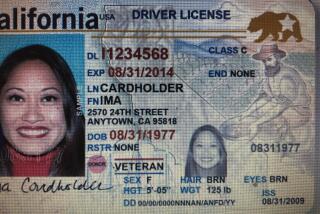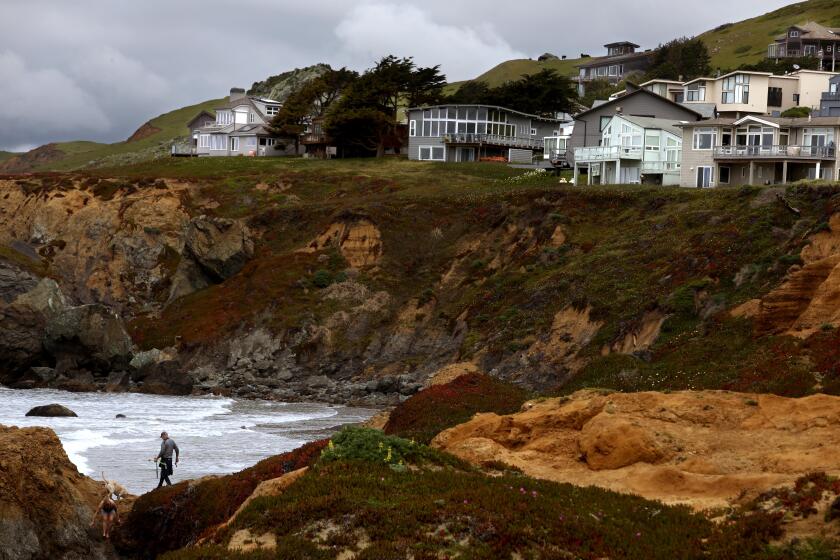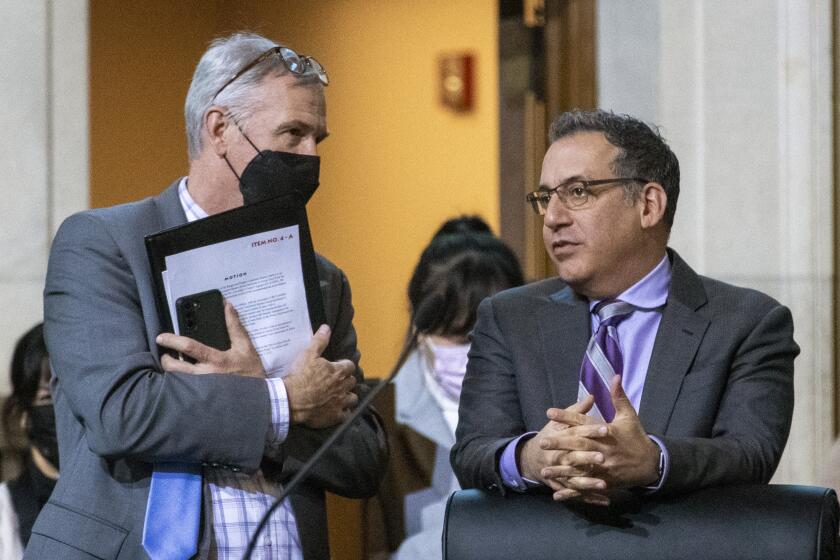State Agency Clears Lomita Group; Leader Criticizes City Inquiry
The leader of a Lomita citizens’ group criticized city officials at a council meeting Monday for seeking an investigation of his group by the state Fair Political Practices Commission, calling the action harassment.
“I think the tone of this is kind of obvious, and I think it’s inappropriate,” said Mark Hays, organizer of Citizens for a Better Lomita.
But Hays said the group had been vindicated because the commission concluded that it was not in violation of state law. A commission spokeswoman confirmed that decision Tuesday.
Mayor Charles Belba defended the city, saying the inquiry about the group’s legality was intended to prevent “any problems down the line.”
In an interview Tuesday, Belba said the commission’s decision “cleared the air. As far as I’m concerned, the matter is dead.”
In a Sept. 18 letter to the political practices agency, City Administrator Walker Ritter said the city attorney had issued an opinion that the Citizens for a Better Lomita was probably a political committee. Ritter asked that the commission examine whether the group is subject to regulation under the state Fair Political Practices Act.
An opinion issued by Robert V. Wadden Jr. of Burke, Williams & Sorensen, the law firm retained by the city, stated that if the group is a committee, had received contributions totaling more than $1,000 or was formed in support of a ballot measure, it must file statements of organization and campaign statements with local and state officials.
However, Sandra Michioku, a commission spokeswoman, said Tuesday that the commission has concluded that the group did not violate state law and is not subject to regulation by the commission.
“The group only opposed a proposed ordinance being voted on by the City Council,” Michioku said. “There was no indication they supported any ballot measure or candidate. Consequently, the group has not received contributions or had expenditures of $1,000 or more in relation to campaign expenditures.”
Ritter said the city was notified of the commission’s decision Tuesday but declined further comment.
At the council meeting, the city’s request brought an angry response from Hays.
“Frankly, to me the obvious conclusion is harassment,” Hays told the council. “I would question whether the city has any business spending the city’s money in investigating citizens’ groups in this way.”
The cost for the city attorney’s opinion was covered under the city’s regular retainer fee for the law firm, Belba said.
Hays, who represents a coalition of about 200 Lomita residents and business owners, first clashed with the city in 1987, after officials proposed an ordinance to rezone a mile-long corridor of Pacific Coast Highway in an effort to attract larger retail businesses. After making several revisions in response to the group’s concerns, the City Council passed the ordinance this summer by a 4-1 vote.
Hays said he learned in September that the city had asked the political practices commission to investigate the group when he received a copy of the city attorney’s opinion and a letter from the city, signed by Ritter.
At Monday’s meeting, Belba said Hays had sent him a letter asking if the city had authorized Ritter’s request to the commission for an investigation. Belba, who asked that the item be put on the council agenda, defended the city’s action, saying the efforts to determine whether the group was operating legally were appropriate.
“I felt it was a wise move by the city manager if he thought there was a committee, a council member, a commissioner--anyone within the purview of the city that fell under (the jurisdiction of) the act,” Belba said.
Belba said council authorization was not needed for Ritter to request a legal opinion about the group from the city attorney because the request was within Ritter’s jurisdiction. He added that Ritter’s request to the political practices panel was necessary because the city attorney’s opinion was inconclusive.
Ritter did not discuss the issue at the council meeting but said Tuesday: “My position is (that) I fulfilled my obligation as a public official.” In an interview, Hays called the city’s action a witch hunt.
The ordinance disputed by Hays’ group went into effect in August. It sets minimum standards for new commercial lots on Pacific Coast Highway of 100 feet in width and 10,000 square feet in area.
Some owners of the small businesses that line the city’s busiest commercial corridor had initially expressed concern that the new requirements would make their buildings nonconforming, but the city revised the ordinance to allow existing 50-foot-wide buildings.
But Hays said he remains dissatisfied with a requirement that some businesses, including medical and other professional offices, be restricted to the second floor. He said after Monday’s meeting that he plans to mount a campaign to place the issue on the city ballot in June.
More to Read
Start your day right
Sign up for Essential California for news, features and recommendations from the L.A. Times and beyond in your inbox six days a week.
You may occasionally receive promotional content from the Los Angeles Times.






